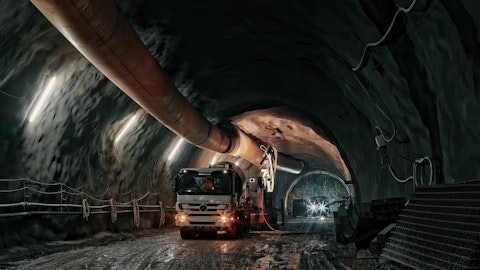In this article, we will be taking a look at the 20 biggest infrastructure companies in the U.S. To skip our detailed analysis, you can go directly to see the 5 biggest infrastructure companies in the U.S.
For a country to develop and improve its standard of living, improved infrastructure is not just essential but integral to said development. Reliable infrastructure allows for supply chains to link up and efficiently move goods and services across various locations. Households are connected to major metropolitan areas where greater job opportunities are present and thus, allow for an increasing pool of talent, decreasing unemployment. Similarly, broadband services allow for greater remote connections than ever before, and in a world where remote working is becoming more and more common, can also directly result in higher employment and better standards of living even in remote areas. This is why many developing economies attempt to spend heavily on infrastructure and companies, while the poorest countries in the world are known for their lack of proper infrastructure.

In the U.S., the debate on railroads, which are a crucial part of the country’s economic stability, raged in late 2022 when railroad workers threatened a strike, and the shutdown would have cost billions of dollars in damage at the very minimum to the nation’s economy, which was already battling an impending recession because of high inflation and hiking of interest rates. Even though the top railroads in the country, some of which are also among the biggest infrastructure companies in the U.S., earned soaring profits in 2022, none of this was transmitted to the labor, the backbone of the industry. The railroad workers demanded better pay, improved working conditions and paid time off. Generally, the government can’t do much to stop protests and strikes under expression of free speech, but the railroad industry works a little differently. Because of an almost century old arcane law that governs only airlines and railroads, what should have been an economic issue became a political one, and allowed the government to intervene.
Because of The Railway Labor Act, the House committee was able to impose the same contract terms on railroad workers that they had firmly rejected, and this was swiftly followed by confirmation in the Senate. After that, U.S. President Joe Biden signed the measure in December 2022, and thus, the possibility of a strike was averted even though railroad workers were not happy with the package they were getting. The strike would have resulted in almost 30% of the country’s freight shipments coming to a halt, and would likely have directly increased inflation. While the end result was excellent for some of the largest infrastructure companies in the U.S. and shareholders, the news was not good for those forced to work for these companies in such conditions.
According to UBS, infrastructure industry performance in 2022 remained stable even as global economic turmoil continued to rise. The main aim of the infrastructure industry, and the biggest infrastructure companies in the U.S., is to continue increased focus on digitization and decarbonization, two of the most important cornerstones in terms of assessing a company’s outlook and growth potential as financials alone are no longer sufficient to determine whether a company is a good option for investment. While most infrastructure companies have maintained stability, those engaged in the oil and gas sector have deliver robust growth as energy prices sky-rocketed as a direct result of Russia’s invasion of Ukraine. However, this growth does not seem to very sustainable as oil prices have already dropped significantly from their peak and commodities are expected to be moderate in both 2023 and 2024. Meanwhile, private infrastructure companies are in the spotlight currently as they have demonstrated resilience even in a turbulent market and have been considered great opportunities for investment right now.
Summarizing their results in 2022 and outlook for 2022, Union Pacific Corporation (NYSE:UNP), one of the biggest infrastructure companies in the U.S., mentioned in the company’s Q4 2022 earnings transcript “However, we remain optimistic that we will be Industrial production with our strong focus on business development. So now moving on to slide eight. Here is our market outlook for 2023 as we sit here today. Starting with our Bulk commodities, we expect a challenging year were grain based on drought conditions, which will affect crop availability in UP served origin. However, we expect to see growth in coal, even though natural gas prices have come off their highs, low inventories will continue — will support continued demand. We are keeping a close eye on natural gas prices, given the price impact of our index based contracts. In addition, we expect biofuel shipments for renewable diesel to continue to grow due to solid market demand, new production facilities coming online and business development wins. Moving on to Industrial. The forecast for Industrial production is to shrink slightly in 2023 and the demand is softening in forest products. However, we expect to see continued strength in metal with new business wins. And lastly, for Premium, we expect the entire Intermodal market to be challenged, both international and domestic by high inventory levels, lower truck rates and temper consumer spending. We expect to outperform that market, however, through our new business with Schneider, as well as opportunities to grow with other private asset owners and our strong IMC partners. We expect automotive growth to be another bright spot in this segment driven by production strength and inventory replenishment.”
The biggest infrastructure companies in the U.S. have combined revenues in excess of $520 billion annually, while their market cap exceeds $862 billion. To finalize our list, we consulted companies from Engineering News Record Top 100 list and from Fortune 500. For companies which were listed, their trailing twelve month revenue (TTM) and latest market cap was taken from Yahoo Finance and were ranked based on their average ranking for the two criteria. For companies which weren’t listed, we obtained revenue figures from either their own website or from Forbes, and their ranking was based solely on their revenue. So now, let’s take a look at the companies integral to the U.S.’s success in the future, starting with:
20. DPR Construction
Total revenue (in billions): $6.8
Market cap as at 11th April 2023 (in billions): N/A
DPR Construction is headquartered in California, and is engaged in the construction of healthcare buildings, schools, hotels and officers.
19. Skanska U.S.
Total revenue (in billions): $6.9
Market cap as at 11th April 2023 (in billions): N/A
The U.S. branch of the Swedish construction giant, Skanska U.S. is engaged in the construction of stadiums, hospitals and airports.
18. Whiting-Turner Contracting
Total revenue (in billions): $8.8
Market cap as at 11th April 2023 (in billions): N/A
Whiting-Turner Contracting is engaged in construction and general contracting and was recently awarded a $20 million contract for the design and construction of maritime operations and a boat maintenance facility.
17. Par Pacific Holdings, Inc. (NYSE:PARR)
Total revenue (in billions): $7.3
Market cap as at 11th April 2023 (in billions): $1.7
Par Pacific Holdings, Inc. (NYSE:PARR) is engaged in the oil and gas industry, and is one of the newest companies among the largest infrastructure companies in the U.S., having been established in 2012. Par Pacific Holdings, Inc. (NYSE:PARR) has continued to establish refineries and is a market leader in the state of Hawaii.
16. STO Building Group
Total revenue (in billions): $9.5
Market cap as at 11th April 2023 (in billions): N/A
STO Building Group is a construction company which creates workplaces and hospitals, not to mention cultural centers. The group currently owns around 14 companies and nearly 50 offices across the world.
15. Kiewit Corp
Total revenue (in billions): $12.1
Market cap as at 11th April 2023 (in billions): N/A
Kiewit Corp is one of the largest private construction companies in the U.S. and has over 28,000 employees.
14. Crown Castle Inc. (NYSE:CCI)
Total revenue (in billions): $58.1
Market cap as at 11th April 2023 (in billions): $7.0
Crown Castle Inc. (NYSE:CCI) provides shared communications infrastructure in the U.S. including small cells, cell towers and fiber, and counts itself among the largest U.S. infrastructure companies.
13. Fluor Corporation (NYSE:FLR)
Total revenue (in billions): $13.8
Market cap as at 11th April 2023 (in billions): $4.2
Fluor Corporation (NYSE:FLR) is one of the biggest engineering companies in Texas. More than a tenth of Fluor Corporation’s (NYSE:FLR) stock is now owned by Wellington Management. The share price of Fluor Corporation (NYSE:FLR) has stayed the same over the last one year with its gains being wiped out over the last few months.
12. Norfolk Southern Corporation (NYSE:NSC)
Total revenue (in billions): $12.7
Market cap as at 11th April 2023 (in billions): $46.1
Norfolk Southern Corporation (NYSE:NSC) is one the biggest railroad companies in the U.S., not to mention among the largest infrastructure companies in the U.S. Norfolk Southern Corporation (NYSE:NSC) has been in the news the past few months for a massive derailment in East Palestine, Ohio, which resulted in the release of tons of toxic chemicals, and has recently been sued by the Department of Justice for the same.
11. American Tower Corporation (NYSE:AMT)
Total revenue (in billions): $10.7
Market cap as at 11th April 2023 (in billions): $97.0
American Tower Corporation (NYSE:AMT) owns and operates wireless and broadcast communications infrastructure not just in the U.S. but in several other countries as well. In the last 6 months, the share price of American Tower Corporation (NYSE:AMT) has risen by 13.4%.
9. Sempra (NYSE:SRE)
Total revenue (in billions): $14.4
Market cap as at 11th April 2023 (in billions): $48.9
Sempra (NYSE:SRE) is one of the biggest energy suppliers in the U.S. with around 40 million customers. Headquartered in California, Sempra (NYSE:SRE) has over 20,000 employees currently.
8. Kinder Morgan, Inc. (NYSE:KMI)
Total revenue (in billions): $19.2
Market cap as at 11th April 2023 (in billions): $39.9
Kinder Morgan, Inc. (NYSE:KMI) is one of the largest infrastructure companies in the U.S., having an interest in or operating over 82,000 miles of pipelines in addition to 140 terminals. Recently, Kinder Morgan, Inc. (NYSE:KMI) has continued to outpace stock market gains, gaining 5.5% in the last one month.
7. Plains All American Pipeline, L.P. (NASDAQ:PAA)
Total revenue (in billions): $57.3
Market cap as at 11th April 2023 (in billions): $9.1
Plains All American Pipeline, L.P. (NASDAQ:PAA) is engaged in pipeline transport and midstream energy infrastructure. Reaping benefits from the rise in energy prices in 2022, the share price of Plains All American Pipeline, L.P. (NASDAQ:PAA) increased by nearly 20% in the last one year.
6. CSX Corporation (NASDAQ:CSX)
Total revenue (in billions): $14.9
Market cap as at 11th April 2023 (in billions): $61.4
CSX Corporation (NASDAQ:CSX) is engaged in the business of real estate and rail transportation, and is headquartered in Florida. CSX Corporation’s (NASDAQ:CSX) ROE has exceeded the industry average in the past though part of that is because of the company’s high debt portfolio.
Click to continue reading and see the 5 biggest infrastructure companies in the U.S.
Suggested articles:
- 15 Best States To Live In: 2023 Rankings
- 25 Best Hospitals in the U.S.
- 25 Countries With The Highest Cost of Living In The World in 2023
Disclosure: None. 20 biggest infrastructure companies in the U.S. is originally published at Insider Monkey.





